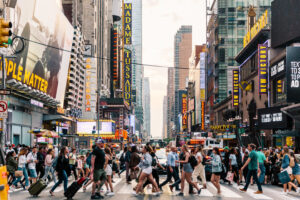Sustainable innovation is a process. And sometimes, this involves collecting – and implementing – feedback from thousands of stakeholders.
How a Spanish Retailer Grew 15 Percent with Collaborative Decision-Making
Collect input from 12,000 employees and 350,000 customers. Seem laborious? Absolutely. Is it worth it? For Spanish retailer Eroski, the answer is a resounding yes.
Employee and customer engagement were key to navigating Eroski’s way through the financial crisis. Pre-crisis research indicated that alliances, joint ventures, and corporate networks drive business innovation. Yet, researchers from IESE Business School at the University of Navarra wanted to dive deeper. In 2006, Silvia Ayuso, Miguel Angel Rodríguez, and Joan Enric Ricart asked:
What does it take to generate sustainable innovation?
Dialogue, Democracy, and Decision-Making
Eroski encompasses more than 1,000 outlets in Spain including supermarkets, gas stations, pharmacies, and travel agencies. It is part of a federation of cooperatives, the Mondragón Corporation, frequently upheld as an exemplar of corporate democracy. As such, Eroski was the ideal candidate for the case study.
The researchers gathered data via reports and interviews in which they asked managers, employees, and customers open-ended questions about innovation processes, company management of employees, and customer relations. Following interviews and data collections, the researchers then identified principal components.
Results indicated that Eroski’s sustainable innovation is fuelled by a democratic structure that facilitates dialogue – interactive, two-way communication between customers and employees. This democratic structure provides a platform for sustainability within organizational dialogue, which in turn drives sustainable innovation.
How Decisions Are Made at Eroski

Over 12,000 employees, comprising 41 per cent of total personnel, are shareholders. Employee shareholders elect regional delegates, who then elect members to the Social Council.
Consumer shareholders, numbering over 350 000 members, elect their delegates to a Consumer Council through local commissions.
Shareholders meet at the annual Preparatory Assembly to elect the General Assembly.
The General Assembly is the supreme authority expressing the will of all cooperative members. It approves strategic plans and nominates the Social Council and the Rector Council.
The Rector Council, made up of six employee and six consumer shareholders who are elected for four years, meets monthly and is responsible for supervising Eroski’s management. Half of these members are replaced every two years.
Employ or Redeploy
Implementation of Mondragón’s employee transfer strategy is one example of sustainable innovation. Instead of laying off workers, Eroski voted to redeploy employees from Mondragón businesses that were hard hit by the financial crisis to those that were experiencing growth (Johnson, 2013). This is in stark contrast to job-shedding at many other Spanish companies driving Spain’s sky-high unemployment rate.
Listen to Locals
At individual retailers, dialogue between customers and employees also drives product innovation. Heeding customer feedback, a hypermarket (superstore) in San Sebastián now capitalizes on local produce and over 1000 organic products as its main features. It serves as an example of a business guided by modern consumer behavior (Lunney, 2013).
Innovation through Focus – Not Hocus Pocus
Sustainable innovation is achieved through process rather than ad hoc bursts of genius, and Eroski is a prime example of this. For Txema Gisasola, president of Mondragón: “This is not magic. We are in this market, competing in the capitalist world, and the only difference is how we do things and why we do things” (Johnson, 2013).
Sustainable innovations contributed to Eroski’s corporate growth. Despite 2012 losses, Eroski’s supermarkets and hypermarkets grew at 9% and 15% respectively.
Ayuso, S., Rodríguez M.Á. and Ricart, J.E. 2006. Using stakeholder dialogue as a source for new ideas: a dynamic capability underlying sustainable innovation. Corporate Governance. 6-4: 475-490.
Johnson, Miles. 2013. Drivers of change: Workers united. The Financial Times Limited. Accessed March 21, 2013.
Lunney, Ellen. 2013. Eroski Invests €2M In San Sebastián Hypermarket. ESM. Accessed July 17, 2013.
The Economist. 2013. Trouble in workers’ paradise. The Economist. Accessed November 9, 2013.


Add a Comment
This site uses User Verification plugin to reduce spam. See how your comment data is processed.This site uses User Verification plugin to reduce spam. See how your comment data is processed.